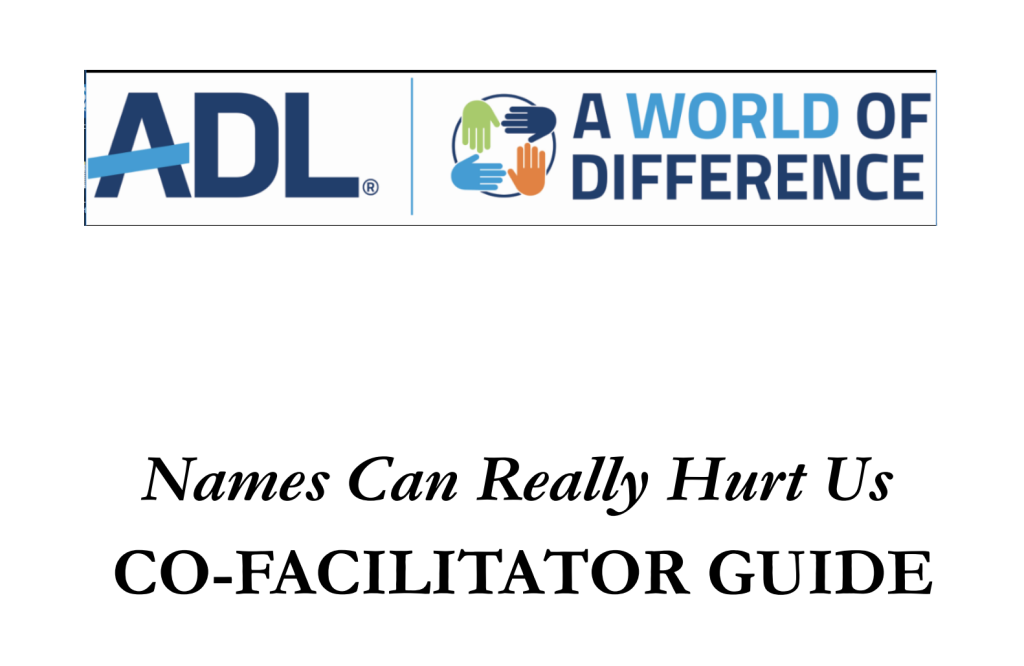
Please Follow us on Gab, Minds, Telegram, Rumble, Gab TV, Gettr, Truth Social, Twitter
We received copies of the materials to be used for the Anti-Defamation League’s (ADL’s) “Names Day” presentation for 9th graders at Greenwich High School.
The “Names Can Really Hurt Us” program is part of ADL's A World of Difference® Institute which seeks to "help participants recognize bias and the harm it inflicts on individuals and society; explore the value of diversity; improve intergroup relations; and challenge racism, antisemitism and all forms of prejudice and bias."
Of course this sounds like a wonderful program, and who could disagree with any of these objectives on the surface?
Disagreeing would make you anti-semitic or racist or transphobic, wouldn’t it? And who would want to be called those names? Especially when we know names can really hurt us.
Worse, you could be viewed as “pro-bullying”, and nobody wants to be viewed as a bully!
That’s part of the genius behind the carefully chosen “words” used to market programs like this. You cannot oppose them without looking bad.
For the record, we don’t have a problem with the program’s lofty intentions. We think there is significant value in these sorts of exercises so long as they are done in a balanced manner by an apolitical organization that is inclusive of the whole community’s values, and not representative of just progressive values.
So how does the Names Day program actually work?
A group of students and teachers are first selected to participate in the program as panelists and facilitators. This opportunity can be presented as a volunteer opportunity, but selection is to be conducted through a nomination process. This group will have access to two special ADL training sessions used to develop speeches that the selected participants will deliver during the full 9th grade assembly.
Students are led through a variety of interactive exercises.
The “What Makes a Group” exercise teaches the children to identify similarities and differences they have with other participants. Categories include physical traits such as eye color, social group labels, religion, and so forth. Another exercise, "Ourselves Our School", encourages students to "take a stand” in response to a series of questions (e.g., if you were born in Greenwich, if you were born in another state, if you want to be treated with respect, etc.). The “Circle Game” teaches students how it feels to be excluded from a group.
Then there is the “Four Squares” activity which teaches students to label people in a bullying situation as targets, perpetrators, bystanders and allies, and then reflect on times they have been affected by prejudice and examine the roles they played. The implicit assumption is that everyone has been a victim of prejudice, and that this must be a systemic issue. The program then suggests that you support targets (the “oppressed”), educate perpetrators (the “oppressors”) and get bystanders to become “allies” who then “chooses to take action” presumably in the name of social justice.
The Names Can Really Hurt Us Co-Facilitator Guide included a comment about misinformation that encouraged facilitators… “don’t let misinformation stand. It implies that you agree with it.” Which naturally leads one to wonder who judges what is considered to be misinformation? And what does the ADL consider to be misinformation?
The ADL has called Mike Lindell an "election fraud conspiracy theorist” for spreading “misinformation” about the 2020 election. The same is true for Dinesh D’Souza, who made the 2000 Mules documentary. ADL has asserted that the Project Veritas "account continues to actively share misinformation about COVID, LGBTQ+ individuals and vaccines.” And ADL has called conservative thought leader Christopher Rufo a “fearmongerer” for alleged misinformation he’s given about radical gender ideology, and for his anti-critical race theory stance.
The group has labeled popular conservative twitter accounts, such as Libs of TikTok and Gays Against Groomers, as extremists for alleged anti-LGBTQ hate. And it regularly denounces Fox News and especially “right wing” media personality Tucker Carlson.
The views expressed by ADL are not apolitical, and there is clear liberal bias against certain concepts deemed to be “right wing” or conservative in nature. Are the anti-conservative biases of the ADL explicitly and/or implicitly communicated to students during Names Day?
Additionally, participation in the ADL’s program also offers a subtle signal to students that the school believes ADL is a “good” and “worthy” organization. After all, GHS has had a relationship with ADL for 20 years, so why shouldn’t you? And if you are against the “anti-defamation” league, by liberal logic it would make you “pro-defamation” — clearly a bad thing.
Too bad Greenwich didn’t opt for a program offered by an organization without all of the political baggage.
P.S. The full cost of the program is $6,000, but ADL offers a grant of $1,000…
